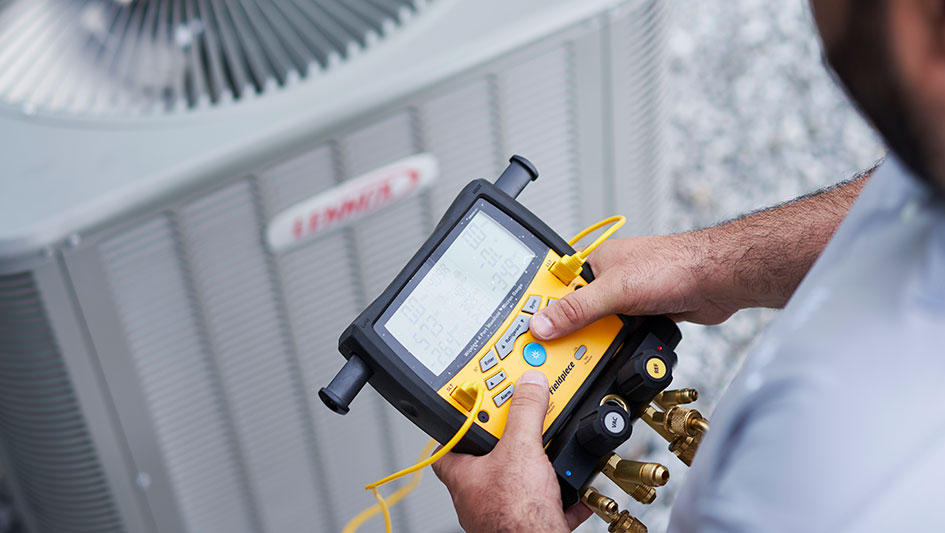
If you’re wanting to find a new, well-paying career, look no further than heating, ventilation and air conditioning. HVAC is one of the quickest-growing careers you can find, according to the U.S. Bureau of Labor Statistics, which expects careers in this trade will expand by 13 percent by 2028.
There are a few reasons why these careers are growing so rapidly. One is homeowners using government refunds to install more energy-efficient comfort systems. Then there’s the discontinuation of R-22 Freon® refrigerants, which affects old equipment. In conclusion, there’s the red-hot home market and a house shortage that’s driven a boost in new construction homes.
One of the most needed jobs is working as an HVAC technician. Find out about what they do, how to become one and about how much you can expect to earn.
What Is an HVAC Technician?
An HVAC technician is an individual who fixes, installs and maintains heating and cooling units. Most assist both homeowners and business owners. And, most important, you’ll be knowledgeable about:
- Air conditioners
- Furnaces
- Mini-splits and heat pumps
- Thermostats and home zoning
- Indoor air quality products such as air filters and air purification systems
Some are HVAC-R professionals, which means they also can take care of refrigeration.
Is HVAC a Hard Career?
While HVAC can be physically demanding, it can also be very satisfying. As a technician you should be able to:
- Work in uncomfortable settings, including crowded or dirty spaces.
- Work in hot or cold areas because equipment is usually outdoors.
- Work evenings, weekends and overtime during peak times.
One of the most common misconceptions about HVAC is that it’s a blue-collar job. It requires a distinct skill set, specialized instruction and ongoing endorsements.
It’s an excellent career option if you want to:
- Avoid heavy amounts of higher education debt.
- Avoid working at a desk or in an office.
- Have job security being sure your position can’t be outsourced.
- Be your own boss and own your own successful business.
How You Can Start Your Careers as a Professional HVAC Technician
To become an HVAC technician, you’ll need a high school diploma or GED, as well as comprehensive training. Other more specialized (and higher paying) HVAC jobs typically require extra education or qualifications.
You can get your certification by attending classes at a community college or trade school. How long it takes to become an HVAC technician depends on the program, which is usually six months to two years. Your employer might also want NATE certification. This stands for North American Technician Excellence, this industry-leading accreditation improves your technical expertise to help you better serve customers.
Career Explorer says that technicians who have expertise with tablets, electronics and troubleshooting will be in great demand as equipment evolves.
Another perk of working in HVAC is little to no student debt.
According to Midwest Technical Institute, attending a technical or trade school often costs around $15,000. A community college usually costs around $5,000 annually. In contrast, the average student debt for a bachelor’s degree is $25,921.
Common Duties of an HVAC Technician
Your work schedule might vary depending on where you work. If you do repairs, you might work early, late or be on call. If you work in construction/home building or management, you might have more of a fixed schedule during usual business hours.
As a technician, you’ll visit different locations for repair, maintenance or installation work. Some work might require more time than others, so the number of calls you can take care of could vary.
As we went over previously, you should be used to working outdoors in extreme weather, in addition to dirty or cramped areas. If you work in a customer-facing role, solid customer service skills are always a plus.
Typical Salary Rates for {Professional Technicians|Technicians|Full-Time Technicians and Other Careers in HVAC
Since HVAC is a fast-growing industry, your salary will reflect it. The national average salary for an HVAC technician is $49,242, according to ZipRecruiter. Top earners get between $56,600 and $68,000. However, salaries may be different based on your area and its cost of living.
Aside from owning your own business, there are several additional career opportunities. These can be:
HVAC manager, $72,515 average salary
HVAC service manager, $71,176 average salary
Where the Demand for HVAC Technicians Is Highest
HVAC technicians are desired across the United States, but even more so in Florida, California, Texas, New York and Illinois. According to hvacclasses.org, these states employ the greatest number of HVAC workers and are dealing with major construction growth. Here’s why:
- Florida: Hurricanes, education and healthcare buildings.
- California: Wildfires, transportation, energy and utility updates.
- Texas: Hurricanes, energy, utility and other infrastructure projects.
- New York: Residential and infrastructure projects.
- Illinois: Companies relocating to the Chicago area.
Where HVAC Technicians Will Be in High Demand in the Future
Projections Central, who creates long-term occupational projections, forecasts these states to have the highest demand for technicians by 2028:
- Utah, 31.1%
- Colorado, 29.7%
- Nevada, 27.9%
- Arizona, 21.4%
- Iowa, Oregon and Montana, 18.5%
- Arkansas, 16.3%
- Florida, 16.2%
- South Carolina, 16%
- Texas, 15.9%
- Idaho, 15.7%
- Washington, 15.6%
- North Carolina, 15.5%
- Tennessee, 15.2%
- Wyoming, 14.3%
- Nebraska, 13.9%
- Indiana, 13.8%
- North Dakota, 13.8%
Here’s where the highest number of new jobs during that time frame are anticipated to be:
- Florida, 5,420
- Texas, 5,530
- California, 4,100
- North Carolina, 2,510
- New York, 2,290
- Colorado, 2,000
- Ohio, 1,550
- Pennsylvania, 1,510
- Virginia, 1,500
- Tennessee, 1,360
- Washington, 1,290
- Georgia, 1,270
- New Jersey, 1,170
- Utah, 1,170
- South Carolina, 1,1060
- Indiana, 940
- Maryland, 820
- Missouri and Arizona, 810
- Michigan, 780
Weather and economic development is anticipated to fuel expansion in these states, according to hvacclasses.org.
Grow a Career in HVAC with Ilten's
HVAC technicians are required across the USA and in Cedar Rapids. To find out more about our openings, view our careers page or call us at 319-208-2351 now!
